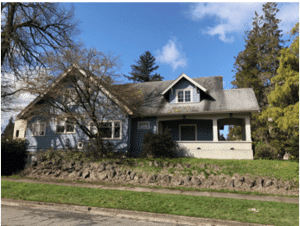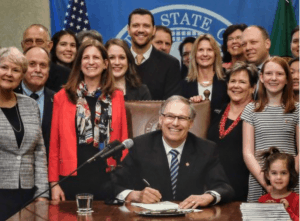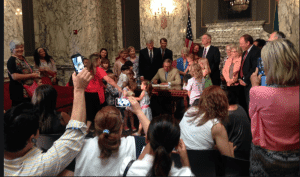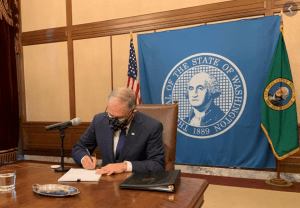
Notes From Olympia: April 16, Week 14 of the 2021 Legislative Session
In this Week’s Notes from Olympia: Weekly Highlights, the “Blue Press House” and Trivia
Trivia!
Now that bills are making their way to the Governor’s desk, how much time does the Governor have to act on a bill?
Weekly Highlights
End of Session is Near. After a marathon weekend of floor activity prior to the Sunday, April 11th 5:00 p.m. deadline for bills to be passed out of the opposite house, this week’s lighter calendar may have provided a moment to catch a breath. That’s not to say there was nothing going on, as both the Senate and House held floor sessions where they reviewed and approved changes made to bills in the opposite house, a process called concurrence.
In addition, budget writers continued their negotiations. At a Tuesday media availability, Democratic leadership shared their current expectation that negotiations will wrap up by early next week, giving staff time to do the hard work of turning the agreements into a budget bill and accompanying supporting documents. Both Senate and House Democratic leaders pledged they will allow time for public review of the budget details prior to their respective votes.
As a reminder – the Legislature is scheduled to Sine Die (adjourn) on Sunday, April 25th. Nine days – but who is counting!
Fair Start for Kids Act Almost Across the Finish Line. The Fair Start for Kids Act is very close to the Governor’s desk with one step remaining in the process – the Senate has to concur (agree) to the amendments made to the bill in the House. Note that if further changes to the bill are needed to align with the final budget agreement, there are procedures for further changes as long as both bodies agree.
As a reminder, Start Early Washington has produced a summary of the Fair Start for Kids Act as passed by the House on April 8th.
Capital Gains Bill Up for Vote Friday. At 9:00 today (Friday), the House Finance Committee is scheduled to vote on a proposed striking amendment to the Capital Gains bill, ESSB 5096. The proposed striking amendment provides that all funds generated by a seven percent tax on certain Capital Gains be deposited into the Education Legacy Trust Account to support K-12 education, early learning and child care.
Under the previous version of the bill, the first $350 million of the revenue generated would have gone into the Education Legacy Trust Account, the next $100 million into the state General Fund and the balance into a newly created “Taxpayer Fairness Account.” Should this striker be adopted, this funding distribution is changed, with all funding going into the Education Legacy Trust Account.
The striking amendment also exempts certain real estate transactions, commercial fishing privileges and qualified family-owned small businesses. If the bill is approved by the House Finance Committee, it would then move to the House Floor and back to the Senate for Concurrence in House amendments. Both the Senate and House proposed budgets assume passage of Capital Gains in their projections.
What is the Future of the Blue Press House?

On the west end of the Capitol campus sit a blue house and a white house, both of which serve as offices for members of the Capitol Press Corps. These houses were a focus of a 2020 Trivia question.
Changes are coming for these buildings as both the Senate and House Capital budgets contain funding for a “Legislative Campus Modernization” project that will mean the end for both houses. The Spokesman Review’s Jim Camden wrote a wonderful column this past Sunday about this modernization effort and shared some memories of his time working from that space. It’s a great read.
Trivia Answer
In Washington state, bills that are delivered to the Governor more than five days before the Legislature adjourns have five days to be acted upon (Sundays excluded). We call these “5 day bills.” Bills that are delivered fewer than 5 days before the Legislature adjourns (or passed in session but delivered after the session concludes) have 20 days to be acted on by the Governor (Sundays also excluded).
It should be noted that once a bill has been passed by both bodies (with its amendments concurred in, if necessary), the bill must then be signed by both the Speaker of the House and the President of the Senate before it is officially delivered to the Governor. The 5- or 20-day clock starts when the bill reaches the Governor’s desk.
How can I find out when bills are being signed? The Governor’s Office maintains a Bill Action section on its webpage that it updates with scheduled bill action and a list of previous action taken.
In pre-COVID times, the bill signings were often a celebratory affair with the legislative bill sponsors and advocates on-hand to pose for a picture commemorating all of the hard work. For some significant bills, signings are held in alternative locations to either accommodate a large group of supporters or to symbolize the bill’s focus (like an education bill being signed at a school).


In contrast, bill signings during COVID:

About the Author

Erica Hallock
Director, Policy & Advocacy, Start Early Washington
Erica Hallock serves as the Director of Policy and Advocacy for Start Early Washington. She has worked in early childhood, health and human services policy in both California and Washington state.
